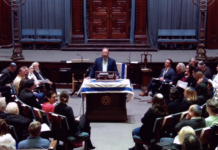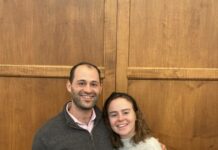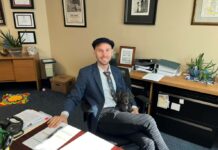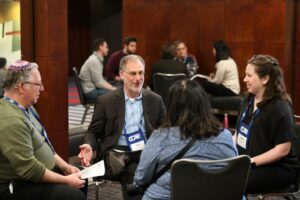
(Photo by Scott Spitzer)
Four hundred and fifty Reform rabbis gathered for the Central Conference of American Rabbis’ 135th annual convention from March 10-14 at the Loews Hotel in Philadelphia.
They discussed climate change, generational differences between Jews and a new Torah translation. They heard speeches from Rabbi Charlie Cytron-Walker, who led his Colleyville, Texas, community through a hostage crisis in 2022, and CCAR CEO Rabbi Hara Person, among others. They also just networked and kibbitzed.
But hanging over the event was the Jewish situation of the moment: war in Gaza and rising antisemitism. What does the Reform movement have to say about this perilous moment in Jewish history?
While there was no official statement from the convention, a few rabbis offered their responses after the gathering.
Rabbi Jill Maderer leads Congregation Rodeph Shalom in Philadelphia. She attended the convention.
Maderer thinks that older Jewish leaders need to start by listening to younger Jews. What do they want from their synagogues?
“If we can let go a bit of some of the things that maybe worked for us and listen a bit more, I think some truths will begin to unfold. And help us rethink or hand over those structures,” she said.
She also believes that security in the form of cameras, locks and other measures is vital today. But she thinks that they won’t be doing their job unless they make all types of Jews feel more comfortable.
“My take on it is that physically we want to fortify because we want our community to feel safe,” Maderer said. “But we need to understand that the very things that make us feel safe may make other Jews — Jews of color, trans Jews — feel less safe.”
The rabbi also wants Rodeph Shalom and other synagogues to continue to root themselves in the Torah. At Rodeph Shalom, leaders begin every meeting with a d’var Torah and include lessons from the Torah in statements about social justice.
“We are constantly rooting in the traditional text,” Maderer said.
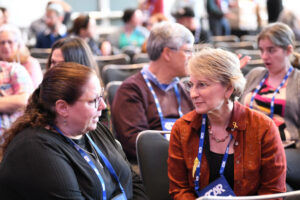
Rabbi Leah Berkowitz guides Congregation Kol Ami in Elkins Park. Like Maderer, she attended the convention.
Berkowitz’s community no longer owns a building, but it still rents space from Beth Sholom Congregation on Old York Road. The rabbi and synagogue members believe it’s still important to get together in person.
The rabbi sees that as key to the Jewish future, too.
“It’s a difficult time to be a Jewish professional and it’s a really difficult time to be a Jew and it’s a really difficult time to be a Jewish student on a university campus,” Berkowitz said. “We’ve come together to support each other. That was very present at this conference. We want to connect with each other and have open conversations.”
Those conversations are the second part of securing the Jewish future, according to Berkowitz.
“It’s really important for us to be able to come together and have difficult conversations and not just let ourselves be polarized and split,” she said. “To be able to sit in a room with people we disagree with and have a civil conversation. It’s difficult to have a civil, nuanced conversation at a rally or on social media.”
Person, the first female CEO of the CCAR, also said that the convention was about having conversations. Other than Cytron-Walker, the CCAR did not host too many big speakers. The point was for rabbis to connect.
The 2024 event was the CCAR’s biggest gathering since before the pandemic, according to Person.
“It was the first conference since the pandemic that was back to feeling like a normal conference,” she said. “What I heard from people was that it felt very warm. It felt very welcoming. It was a way for colleagues to talk openly and be vulnerable. It didn’t feel like an in-club meeting.”
Many of the conversations centered on “the post-Oct. 7 moment we’re all in,” Person said.
“One rabbi said something like, ‘The conversations we had around Israel weren’t really the conversations we wanted to be having around Israel,’” she added. “He just thought it was meaningful to speak and be together. He was OK being in a community that had diverse opinions.”
Out of those conversations, Person picked up on “a general feeling that we need to support Israelis. That there’s a very long road ahead. And that there’s a concern about what’s happening to Gaza and to Gazans,” she said.



